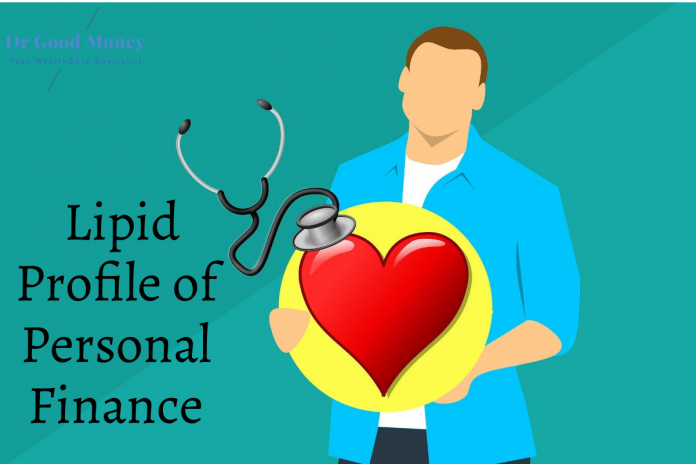Lipid profile is the blood screening test that is done to check your heart health. As the function of the heart is to supply blood, oxygen, and other nutrients to other body parts through the circulatory system, so if the blood carries a high quantity of fats in it then it will impact the functioning of the heart. If the level of fats is too high then it starts accumulating in the arteries which are the main cause of cardiovascular issues.
No, I am not going to tell you how to keep your heart healthy by keeping your lipid profile in check, you doctors have a better understanding of this subject, but I am just relating the lipid profile with basic financial Health check ratios which everyone should do on regular basis to keep their finances healthy.
Cash flow is the bloodline of the personal financial profile and keeping it healthy should be the first and foremost concern in financial management.
Let’s relate Financial Health check ratios with Lipid profile constituents to understand it better.
Lipid Profile and Financial Health check
- LDL Cholesterol and Bad EMIs:
LDL is Low-Density Lipoprotein, considered to be the bad cholesterol as it contributes to the fatty built up in the arteries.
So high levels of LDL are not at all good for health.
Same way Bad EMIs, like for loans taken for consumption as in Personal Loans, Credit card dues/Loans, even Car loans (In case of salaried employees) are not good for your financial health.
Though Loans in any form is not good, still something which is used towards consumption and not for productive purpose is considered to be very bad.
Bad EMIs on one side increases the burden on Cash flow, also does not participate in any asset building. These are pure wastage of important resources, which otherwise can be used towards building up productive assets or increase in earnings.
Your total EMIs should not exceed 40% of your monthly income. and if it is only for Bad loans then the percentage should be 10-15%.
Doctors considering their recession proof income are the first targets of banks and other lenders to provide loans and credit cards. But this is your responsibility to use the same wisely.
2. HDL Cholesterol and Savings:
The role of HDL (High-Density Lipoprotein) is to carry LDL cholesterol away from the arteries and back to the liver. There it’s broken down and passed through the body. Though not completely but some part of LDL gets cleansed with the help of HDL
So a healthy level of HDL is required in the blood. So is the savings. Where the savings would help you achieve your long and short-term goals, there it also helps in curbing the urge to take non-productive loans and thus manage the Bad EMIs level well.
Savings should start from the day you get your first paycheck and should at least be 20% of your monthly Income, even if you are not targeting any goals.
I have seen many young doctors who prefer to go with Vehicle or Home loans first when they get their First paycheck. This is not a good habit, as even though the income is secure, but still even doctors may find challenges in their income in tough times (we have seen this during these covid times).
3. Triglycerides and Total Debt to Asset ratio:
Triglycerides are the form in which most fat exists in the food and the body. High levels of triglycerides, with Low HDL and High LDL, increases the risk of coronary artery disease.
In personal finance, you may treat the high debt levels i.e. Total Liabilities as a metaphor for Triglycerides.
High debt levels in combination with Low savings and high bad EMIs, increases the risk of financial disaster.
Ideally, your total debt value should not be more than 50% of your assets.
Financial lipid Profile – Conclusion
A lipid profile is one of the many medical tests which are conducted to check the overall health of the person. Same way Debt and Cash flow analysis is one of the many areas which need to be watched for overall financial health.
You need to keep your risk profile (Blood Pressure) in check while making Investments.
You have to keep watch on the cash Liquidity position and maintain an adequate emergency fund, keep a check on spending, and be aware of your expenses.
Keep Monitoring your financial health to stay fit.
